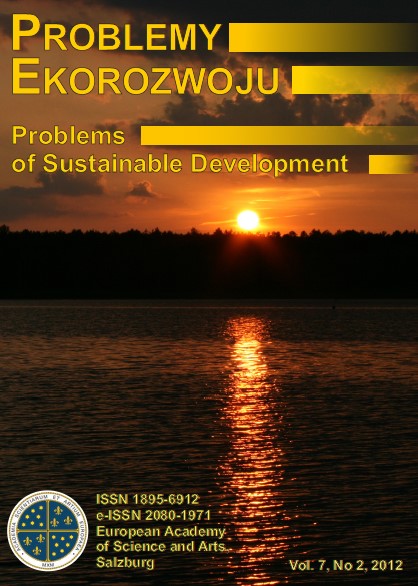Eco-management in Polish Companies
Article Sidebar
Issue Vol. 7 No. 2 (2012)
-
Information: Impact Factor
Lucjan Pawłowski5
-
Do the Liberal Capitalism and Globalization Enable the Implementation of Sustainable Development Strategy?
Lucjan Pawłowski7-13
-
Energy Production from Maize
David Piementel15-22
-
Revealing the Level of Tension Between Cultural Heritage and Development in World Heritage Cities
Molly Turner, Ana Pereira Roders, Marc Patry23-31
-
Low Carbon Development of China’s Yangtze River Delta Region
Shengdao Shan, Xiaohang Bi33-41
-
Sustainable Development: the Upcoming Civilizational Revolution?
Ignacy S. Fiut43-50
-
Social Policy in the European Sustainable Development Strategy
Aleksandra Ciżmowska51-59
-
Does the Evangelical Understanding of the Concept of Property Serve Sustainable Development?
Karolina Szulc61-65
-
Man and Nature. A New Project on New Spirituality
Zbigniew Pasek, Agnieszka Dyczewska67-76
-
Selecting Sustainability Indicators for Local Community – Case Study of Milanówek Municipality, Poland
Justyna Gutowska, Jerzy Śleszyński, Małgorzata Grodzińska-Jurczak77-86
-
Polish Planners’ Attitudes Towards Citizen Participation
Łukasz Damurski87-96
-
Ecosystem Services in the Light of a Sustainable Knowledge-based Economy
Artur Michałowski97-106
-
Eco-management in Polish Companies
Ewa Bojar, Matylda Bojar, Anna Żelazna-Blicharz, Piotr Blicharz107-113
-
Letter to the Editorial Office: Time for the Intellect to Take Over From Mind
G Venkatesh115-117
Archives
-
Vol. 9 No. 2
2014-07-01 16
-
Vol. 9 No. 1
2014-01-02 19
-
Vol. 8 No. 2
2013-07-01 13
-
Vol. 8 No. 1
2013-01-02 12
-
Vol. 7 No. 2
2012-07-02 14
-
Vol. 7 No. 1
2012-01-02 12
-
Vol. 6 No. 2
2011-07-01 19
-
Vol. 6 No. 1
2011-01-03 18
-
Vol. 5 No. 2
2010-07-01 21
-
Vol. 5 No. 1
2010-01-04 16
Main Article Content
Authors
Abstract
Economic activity has an enormous influence on the environment. Enterprises contribute to the progressing degradation of existing ecosystems, cause serious threats to the biological diversity of our planet, emit hazardous pollutants and use available natural resources excessively, which can lead to their premature exhaustion. Therefore, for the world’s nations to grow and develop in a sustainable manner, there is an urgent need to minimize the adverse impact of business activities, households and whole societies on the environment. Environmental degradation cannot be restrained by the neutralization of produced pollutants alone. Today, we need efficient environment-friendly technologies and production processes. Effective efforts aimed at the reduction of our ecological footprint should be undertaken by all involved entities, including designers, engineers and managers at all stages of the product design, production and distribution processes. The concept of corporate social responsibility, understood as a voluntary process of taking into account a wide array of social and ecological issues in all business activities as well as contacts with stakeholders, has become very popular in Poland. Development of the concept of corporate social responsibility (CSR) and sustainable development has a huge impact on the shaping of pro-ecological attitudes in society. From this perspective corporate social responsibility (CSR) can be rightly regarded as a concept useful to ensure sustainable development at the micro-level, i.e. at the level of enterprises. CSR is a component of sustainable eco-management. It can ensure that the principles of sustainable development are effectively implemented at the level of socio-economic systems, as well as individual actors involved in change.
Lublin Voivodeship has a clean and attractive environment. This paper presents research findings of the study carried out in 2005-2010 by researchers from the Faculty of Management, Lublin University of Technology. The main purpose of the study was to analyze the environmental activities and initiatives undertaken by enterprises operating in the region, directions of pro-environmental investments, implemented environmental management systems, as well as motivations of business managers to pay more attention to environmental issues.
Keywords:
Article Details
Abstract views: 64
License

This work is licensed under a Creative Commons Attribution-ShareAlike 4.0 International License.


